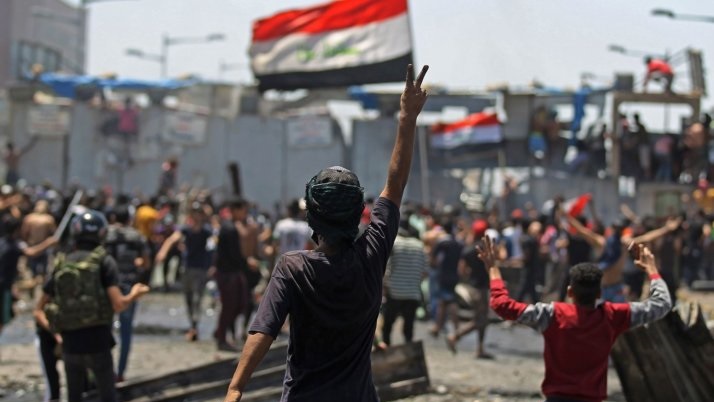Iraq is still a powder keg in the Middle East. It is the scene of geopolitical tensions between Iran — which seeks to solve its own crises and increase its regional influence — and the arrogance of U.S. imperialism, which maintains military bases in its territory to defend positions lost many years ago. The pandemic did not strike catastrophically, as expected because of Iraq’s long border with Iran and its weak health system, but the virus has left hundreds dead and three thousand infected. The reemergence of ISIS is taking advantage of the pandemic situation by recovering territory lost in the northeast of Iraq. But the fall in the price of oil is what is seriously choking the Iraqi economy, which is now in a state of disarray.
The youth demonstrations since last October have demanded a profound reform of the political regime, which has left them unemployed and in despair. At least 700 have lost their lives there, and thousands have been injured by the brutal repression of the police, the army, and Shiite militias — some of which are linked to Iran. The curfew due to the pandemic and the tensions between Iran and the United States during the first months of 2020 created an impasse by physically removing the demonstrators from the streets of Iraq while the price of oil hit a historic low, worsening the social precarization of young workers and popular sectors.
New Wave of Demonstrations
On the weekend of May 10–11, demonstrators resumed the struggle against the government in several parts of the country, a few days before the appointment of the new prime minister, Mustafa al-Kadhimi, who is linked to the same political caste that monopolizes power. The demonstrations were spread throughout the country, where there were hard confrontations with the police in Baghdad, Kout, Najaf, Nassiriya Diwaniya, Samawa, and the Basra Oil Company in the south of Iraq.
Tahrir Square (Liberation in Arabic) in Baghdad is again the center of protesters’ gathering and organization. There were barricades on the al-Jumhuriyah bridge, which leads to the Green Zone, where the embassies are located — including the US embassy, which was bombed in December — and other key areas for the ruling class of the country. “People want the fall of the regime,” the youth shouted, throwing stones and Molotov cocktails at the police, who were not allowing the demonstration to advance over the bridge. There they were repressed with rubber bullets, tear gas, and water cannons.
In Basra, a city with important oil wells and a Shiite majority, the demonstration demanded the removal of Governor Assad al-Eidani — who in December had been nominated as prime minister but was rejected by the demonstrators — and two of his deputies, belonging to the Binaa faction that has links with the People’s Mobilization Units (PMF). In Basra, as the protesters approached the headquarters of an Iranian-backed militia called Thaa’r Allah, armed men guarding the building shot dead one protester, according to Al Jazeera.
The demands echoed the demonstrations of 2019: early elections under a new electoral law, accountability for the hundreds of people killed in the attacks on the movement, and the release of political prisoners; better public services, such as electricity or water, and work to counteract unemployment that reaches half of the young population.
Iraqi and Middle Eastern Perspectives
The appointment by the Iraqi parliament of the former head of Iraq’s secret services, Mustafa al-Kadhimi, was the result of six months of negotiations within the government, but above all of the need for an agreement between the United States and Iran to replace Adel Abdel Mahdi, who was overthrown by the previous demonstrations. Tehran agreed to support the former intelligence chief in exchange for unfreezing some of his assets, which had been attacked by sanctions, but above all because of the need to confront the country’s worst social crisis. For its part, the United States could be regaining lost political influence from the gaps that are opening within the Kataib Hezbollah militias and the People’s Mobilization Units. This represents a retreat of Iranian influence to the detriment of an advance of Iraqi militias seeking greater participation in the political arena.
Al-Kadhimi will have the challenge of solving problems that burden Iraq, problems that are common to all countries in the Middle East — the situation in Lebanon is an example of this. Oil is the center of the problem; its price is on the floor, oscillating between $25 and $30, and 90 percent of the Iraqi economy depends on royalties from black gold, turning the situation into a time bomb. Moreover, even though Iraq is the second-largest OPEC producer, its production is in the hands of imperialist companies such as British Petroleum, Exxon, and Shell, while their most important buyer is China.
On the other hand, young people under 25 represent 60 percent of the population, and half of them are unemployed. Those fortunate enough to work in the public sector — which employs a large proportion of the workforce — are preparing to receive wage cuts of up to 35 percent. The government raised $1.5 billion from oil exports in April, while it needed $5 billion to pay salaries (for 4.5 million workers), pensions, and other expenses. The situation hangs by a thread and is unsustainable, as during May the government failed to pay pensions, according to Kamran Karadaghi, the former chief of staff. This cut could give rise to further demonstrations within the week.
On Saturday, to cool off the demonstrations, al-Kadhimi tried to take some measures such as releasing detained protesters, promising to hold the perpetrators accountable for the killing of at least 700 people during the months-long rallies. And reflecting his attempt at “dialogue,” the repression was “light” compared to the 15,000 injured last October. He also ordered an immediate revision of the electoral law to begin the process of building a new electoral framework. Finally, he reinstated the popular army general, Abdul-Wahab al-Saadi, revered by the Iraqi public for his role in the war against ISIS, appointing him commander of the Iraqi Counter-Terrorism Service. His dismissal in September 2019 was one of the triggers for the October protests. It hardly had any lasting effect. In his speech on Wednesday he promised to punish anyone who attacks the protesters, in the midst of an attempt to advance a new strategic agreement with the United States.
Iraq no longer has significant dollar reserves to deal with the economic situation, pressing for foreign funding, which means more austerity and poverty. If in October with a high-priced barrel of oil, protesters were demanding a bigger slice of the pie, what will happen now that the pie has shrunk?
The pandemic in Iraq hit the economy more than it did in terms of health. The combination of shrinking demand with overproduction of oil — imposed by Saudi Arabia for its “miniwar” on prices with Russia — and the global recession, caused the Iraqi economic model to collapse, but will impact the economy of the entire Middle East.
The demonstrations in Lebanon and Iraq show that the situation of class struggle that ran through all of 2019 is not over, but seems to be heating up for new confrontations.
First published in Spanish on May 15 on La Izquierda Diario.
Translation: Luigi Morris











